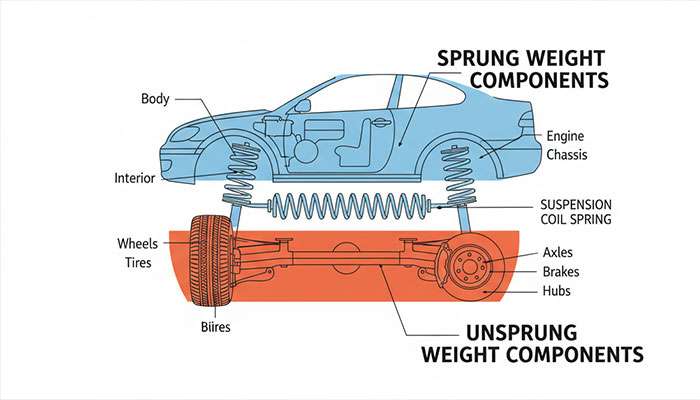
Wheel weight dramatically affects your vehicle's performance in ways that might surprise you. Real-world testing proves that reducing wheel weight by just 12 pounds per corner improved a Mazda Miata's 0-60 time by 0.29 seconds. Even more impressive, a single pound of rotating wheel weight has the equivalent impact of 5-10 pounds of static vehicle weight when it comes to acceleration.
Wheel and tire weight influences every aspect of your vehicle's performance. Lighter wheels deliver measurable benefits beyond just acceleration – fuel efficiency can improve by up to 8% with the right setup. Real testing shows a lightweight configuration achieved 22.8 mpg compared to just 21.1 mpg with heavier wheels. Tire weight matters just as much, since heavier tires demand more energy to accelerate, decelerate, and maintain speed.
We'll break down exactly how wheel weight affects performance using real test data, explain the science behind these effects, and provide practical guidance for both daily drivers and performance enthusiasts. At Performance Plus Tire, we carry an extensive selection of wheels at various weights and can help you understand the real-world impact of your choices.

Two key physics principles determine how wheel weight affects your vehicle's performance: unsprung weight and rotational inertia.
Unsprung weight includes everything not supported by your suspension system – wheels, tires, brakes, and axles. These components sit below your springs and directly contact the road. Sprung weight covers the rest of your vehicle: engine, body, and interior. The difference matters because lighter unsprung components let your suspension respond faster to bumps and road imperfections, which improves handling and stability.
Rotational inertia creates the bigger performance impact. This measures how much an object resists changes in spinning motion. Wheel weight distribution plays a huge role here. A wheel with most weight near the outer rim has much higher rotational inertia than one with weight concentrated at the center hub, even if both wheels weigh the same.
This explains why automotive experts say 1 pound of rotating wheel weight equals roughly 5-10 pounds of dead weight bolted to your car's body. The math backs this up – your vehicle's total energy needs include both forward motion and the energy required to spin those wheels.
City driving puts this into perspective. Acceleration resistance consumes about 40% of your total energy during stop-and-go traffic. Lighter wheels with lower rotational inertia need significantly less energy to speed up or slow down. This translates directly to better performance whether you're commuting to work or hitting the track.

Real-world testing provides concrete evidence of wheel weight impact on vehicle performance. A controlled BMW 3 Series test compared lightweight wheels (17 pounds each) against heavyweight wheels (27 pounds each). The results were clear-cut – the lighter setup outperformed the heavier configuration in every measured category.
Fuel economy data from this test tells the story. Stock wheels delivered 22.8 mpg, while heavyweight wheels managed only 21.1 mpg – that's 7.5% worse fuel economy from wheel weight alone. These numbers matter for daily drivers watching fuel costs.
Acceleration testing proves even more dramatic. Researchers loaded a Miata's trunk with 42 pounds of ballast, slowing 0-60 times by 0.14 seconds. When they moved that same weight to the wheels instead, the penalty doubled to 0.29 seconds. This confirms the 5-10x multiplier effect of rotating weight versus static weight.
A Chevelle test demonstrated similar principles on a larger scale. Reducing total wheel weight by 82 pounds improved quarter-mile time by 0.11 seconds and boosted trap speed by 1.12 mph. Even braking suffers from excess wheel weight – adding 10 pounds per wheel reduces braking effectiveness by approximately 1%.
Track testing reinforces these laboratory results. Vehicles equipped with lightweight wheels consistently post faster lap times, with one comprehensive test showing a half-second improvement per lap. The data speaks for itself across multiple performance metrics.
Daily drivers notice immediate improvements with lighter wheels. Your suspension responds better over bumps and road imperfections, creating a more responsive feel behind the wheel. On rough roads, lightweight wheels allow the suspension to work more effectively, maintaining consistent tire contact with the road surface.
Material choice determines both performance and value. Cast aluminum wheels offer budget-friendly options, though they're heavier with lower load capacity. Flow-formed wheels deliver excellent performance-to-price ratio—providing 85-90% of forged wheel performance at half the cost. For maximum benefits, forged wheels provide ultimate strength-to-weight ratios, though at premium pricing.
Fuel economy results vary based on driving conditions and wheel selection. Testing across 350 miles showed stock wheels averaged 22.8 mpg, lightweight wheels achieved 21.5 mpg, and heavyweight wheels dropped to 21.1 mpg. Heavy wheels burn approximately 7.5% more fuel compared to stock options.
Wider wheels enhance cornering through better sidewall support and increased contact patch. The trade-off comes in higher rolling resistance.
When choosing wheels, consider your priorities. Daily commuters benefit most from flow-formed options that balance performance gains with reasonable costs. Performance enthusiasts should consider forged wheels for maximum acceleration and handling improvements. Either way, lighter wheels reduce strain on suspension components while improving acceleration, braking, and overall driving dynamics.
The data proves that wheel weight affects vehicle performance significantly across all driving scenarios. Lighter wheels deliver real benefits - from faster acceleration and better fuel economy to improved handling and braking performance. Whether you drive daily commutes or weekend track days, these performance gains are measurable and meaningful.
Real-world testing shows the impact clearly. A 12-pound reduction per wheel improved a Miata's acceleration by 0.29 seconds - double the effect of removing the same weight from the trunk. Fuel economy tests revealed up to 8% better efficiency with lightweight wheels compared to heavier options.
The driving experience improves noticeably with lighter wheels. Your suspension responds better to road imperfections, maintaining superior tire contact with the surface. This means improved handling during emergency situations and a more responsive feel behind the wheel.
Material selection plays a key role in getting the right balance of performance and value. Cast aluminum wheels offer budget-friendly options for basic improvements. Flow-formed wheels provide an excellent middle ground - delivering 85-90% of forged wheel performance at half the cost. Forged wheels offer maximum strength-to-weight benefits for those seeking ultimate performance.
Wheel weight reduction stands out as one of the most effective performance modifications available. The multiplier effect - where one pound of rotating weight equals 5-10 pounds of static weight - makes lightweight wheels particularly efficient compared to other upgrades.
At Performance Plus Tire, we carry an extensive selection of wheels at various weights to meet every performance need and budget. Our expert team can help you choose the ideal wheels for your vehicle and driving style. The performance advantages make lightweight wheels a smart investment for anyone looking to enhance their vehicle's capabilities.
Real-world testing reveals that wheel weight dramatically impacts vehicle performance, with lighter wheels delivering measurable improvements in acceleration, fuel economy, and handling across all driving scenarios.
• Rotating weight has 5-10x impact: One pound of wheel weight affects performance equivalent to 5-10 pounds of static vehicle weight due to rotational inertia.
• Significant acceleration gains: Reducing wheel weight by 12 pounds per corner improved 0-60 times by 0.29 seconds in controlled testing.
• Fuel economy improves up to 8%: Lightweight wheels achieved 22.8 mpg compared to 21.1 mpg with heavier alternatives in real-world testing.
• Enhanced handling and braking: Lighter unsprung weight allows suspension to respond faster, improving tire contact and reducing braking distances.
• Flow-formed wheels offer best value: These provide 85-90% of forged wheel performance at half the cost, making them ideal for most drivers seeking performance gains.
The data conclusively shows that wheel weight reduction is one of the most effective performance modifications available, delivering benefits that extend from daily commuting comfort to track performance capabilities.
Reducing wheel weight can significantly improve acceleration. In a real-world test, decreasing wheel weight by 12 pounds per corner improved a Mazda Miata's 0-60 time by 0.29 seconds. This demonstrates that even relatively small reductions in wheel weight can have a noticeable impact on a vehicle's acceleration performance.
Yes, wheel weight can have a substantial effect on fuel economy. Real-world testing showed that lightweight wheels improved fuel efficiency by up to 8% compared to heavier alternatives. In one study, a vehicle with stock wheels achieved 22.8 mpg, while the same vehicle with heavier wheels only managed 21.1 mpg.
Lighter wheels improve handling and braking performance by reducing unsprung weight. This allows the suspension to react more quickly to road imperfections, improving tire contact with the road surface. In terms of braking, adding 10 pounds per wheel can reduce braking effectiveness by approximately 1%.
Lightweight wheels can provide noticeable benefits for daily drivers, including improved fuel efficiency, better handling, and a more responsive feel. While they may require a larger initial investment, the comprehensive performance advantages make them a worthwhile consideration for enhancing your vehicle's capabilities without major modifications.
Cast aluminum wheels are budget-friendly but heavier with lower load capacity. Flow-formed wheels offer an excellent balance, providing 85-90% of forged wheel performance at half the price. Forged wheels provide the ultimate strength-to-weight ratios and maximum performance benefits, but come at premium costs.